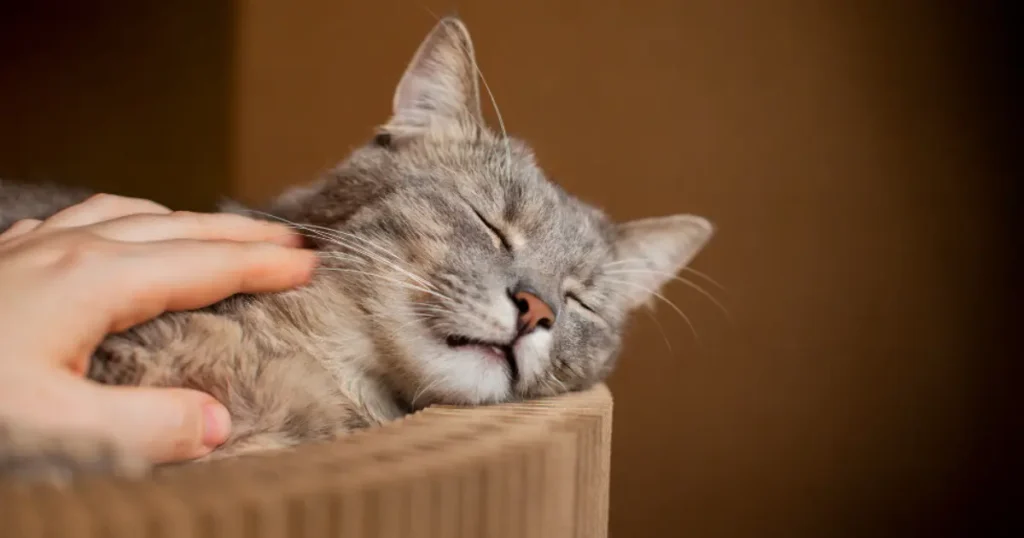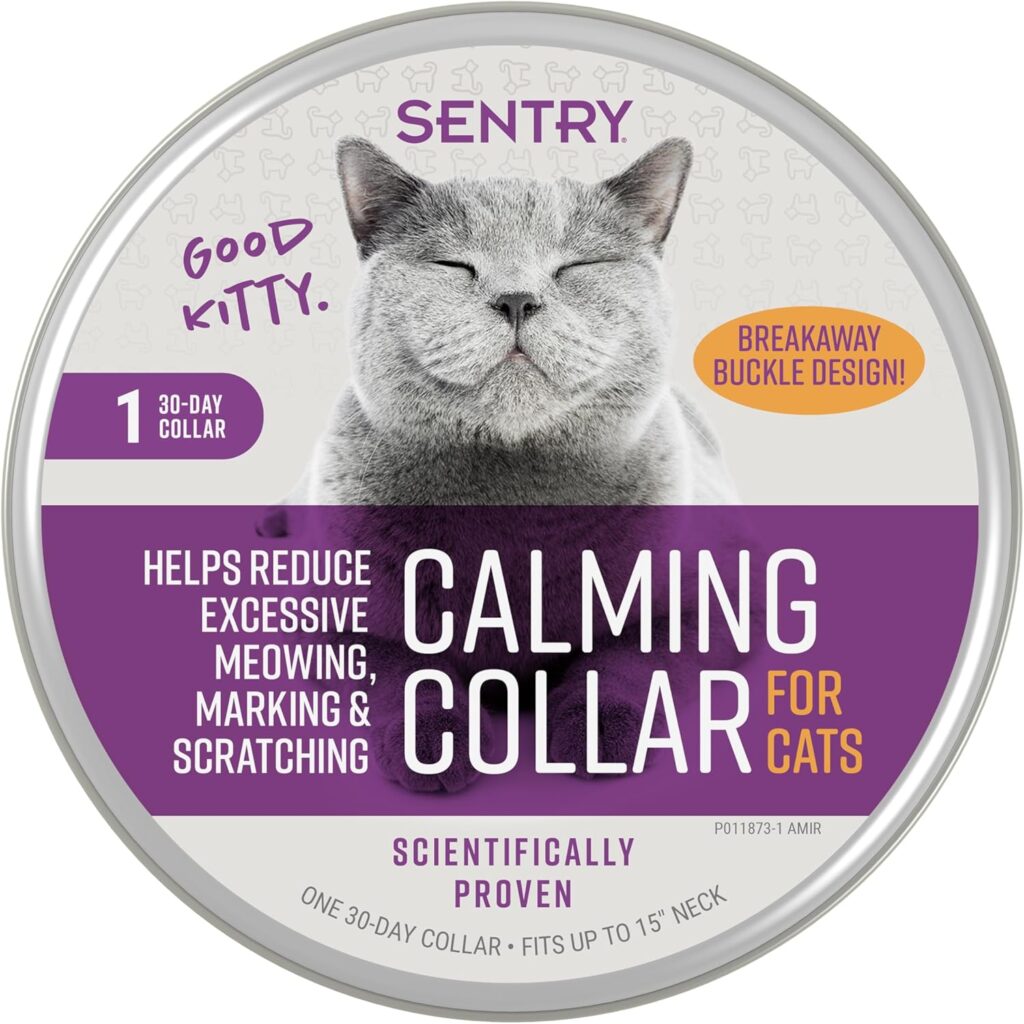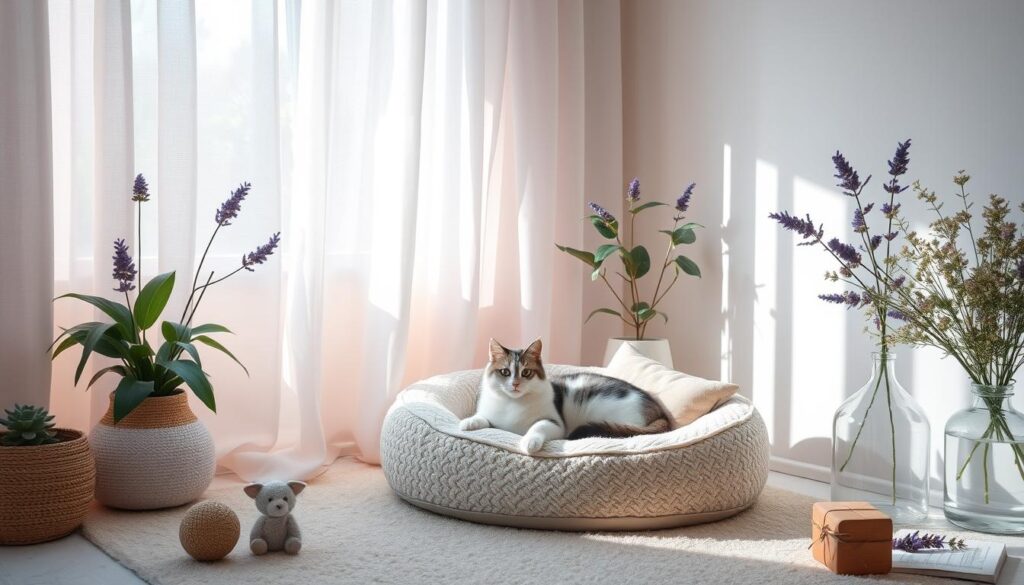As a devoted cat parent, I’ve seen the heartbreaking sight of a furry friend struggling with anxiety. The intense fear, the reluctance to engage, the self-soothing behaviors are tough to watch. But, there are proven, veterinarian-approved methods to help calm your anxious cat.
In this guide, we’ll explore the root causes of feline anxiety and the signs to watch for. We’ll also cover techniques to create a soothing environment for your cat. Whether it’s easing stress from a big move or helping with separation anxiety, you’ll find practical solutions here.
Get ready for a transformative journey with your cat. This journey will strengthen your bond and help your cat become a content, confident companion. Let’s dive in and learn how to soothe your anxious cat, one step at a time.
Recognizing Signs of Anxiety in Cats
As a cat owner, it’s key to know the signs of anxiety in your cat. Spotting these signs early helps you tackle the root causes. This way, you can keep your cat calm and happy.
Behavioral Signs of Cat Anxiety
Cats show different signs when they’re anxious. Some common signs include:
- Excessive grooming or over-grooming
- Urinating outside the litter box
- Destructive behavior, such as scratching furniture
- Increased vocalization, like constant meowing
- Hiding or retreating from social interactions
- Changes in eating habits, such as decreased appetite
- Aggressive behavior towards humans or other pets
Physical Signs of Cat Anxiety
Cats also show physical signs of anxiety. Some common signs are:
- Holding the tail close to the body
- Holding the ears back
- Having the hair standing up
- Avoiding eye contact
- Shifting the body or head away
- Partially or fully dilated pupils
- Trembling or shaking
- Trying to escape or hide
Many things can cause anxiety in cats, like changes in their environment or new pets. Recognizing these signs helps you support your cat’s well-being.
“Cats often express anxiety through behavioral changes like excessive grooming, hiding, aggression, or destructive actions.”
Creating a Calming Environment for Your Cat
It’s important to give your anxious cat a safe and comfy spot. Choose a quiet, hidden area in your home for them to go when stressed. This spot should have soft bedding, places to hide, fun toys, and familiar smells to make them feel calm.
Having a daily routine can also help your cat feel less anxious. Keep their feeding, play, and rest times the same every day. This routine helps your cat feel secure and less stressed by avoiding surprises.
- Create a designated calming space with soft bedding, hiding spots, and familiar scents
- Incorporate stimulating toys and puzzles to engage your cat’s natural curiosity and reduce boredom
- Maintain a consistent daily routine for feeding, playtime, and rest to provide a sense of structure
- Consider using pheromone diffusers or sprays to help soothe your cat’s nerves
- Minimize exposure to loud noises, sudden movements, and unfamiliar visitors to reduce triggers for anxiety
“Providing a safe, comfortable environment is essential for helping anxious cats feel secure and reduce their stress levels.”
By making a calm space and sticking to routines, you can help your cat relax more. Remember, every cat is different. So, watch what your cat likes and adjust their space to fit their needs.
Enrichment Activities to Reduce Anxiety
Anxious cats often feel bored and have too much energy. This can make their stress worse. But, you can help by giving them fun activities that keep their mind and body active. These enrichment activities for anxious cats can really help them feel better and make your bond stronger.
Interactive toys are great for mental stimulation for stressed cats. Puzzle feeders, toys that give treats, and even cardboard boxes can keep your cat’s mind sharp. Playing with them regularly, like with wand toys or laser pointers, is also very helpful.
- Invest in puzzle feeders and treat-dispensing toys to engage your cat’s natural foraging instincts.
- Introduce cardboard boxes, paper bags, and other simple DIY enrichment items to stimulate your cat’s curiosity.
- Dedicate daily playtime sessions to provide outlets for anxious cat energy and strengthen your bond.
Adding scratching posts, cat trees, and vertical structures to your cat’s space is also good. These enrichment activities for anxious cats give them a place to scratch and climb. They also help your cat feel secure and mark their territory.
“Engaging your cat in enriching activities can work wonders for their mental and physical well-being, helping to reduce anxiety and strengthen the bond between you and your feline companion.”
By trying different enrichment activities for anxious cats, you can help them feel calmer and more confident. It’s important to make sure these activities are right for your cat. This way, they’ll feel safe, happy, and loved.
How to Calm an Anxious Cat
Calming an anxious cat needs a few steps. First, make their space safe and comfy. Then, stick to routines and add fun activities. This helps your cat relax and feel better.
Creating a “safe haven” is key. This could be a cozy cat tree or a quiet room with their favorite things. It gives your cat a place to go when they’re stressed.
- Keep a regular schedule for meals, play, and sleep. It helps your cat feel secure.
- Try pheromone diffusers or sprays, like Feliway. They can calm anxious cats.
- Play with interactive toys and do fun activities. It keeps their mind busy and reduces anxiety.
If your cat’s anxiety doesn’t get better, talk to a cat behavior expert or vet. They can give advice and might suggest calming aids or meds.
Using these methods can make your cat’s life easier. It also strengthens your bond with them.

Managing Separation Anxiety in Cats
Many cat owners worry about separation anxiety in their pets. Cats can form strong bonds with their humans. When left alone, they might meow too much, destroy things, or pee in the wrong places. It’s important to address this issue for your cat’s happiness and your home’s peace.
Tips for Easing Separation Anxiety
Here are some ways to help your cat deal with separation anxiety:
- Keep a regular schedule: Cats like knowing what’s going to happen next. So, stick to a routine for meals, playtime, and when you leave.
- Give them fun toys and puzzles: Interactive toys or food puzzles can keep your cat busy and happy when you’re away.
- Get them a cat friend: Sometimes, having another cat around can make your cat feel less lonely.
- Get them used to being alone: Start by leaving for short times and gradually increase how long you’re gone.
Getting help from a vet or a cat behaviorist can also be very helpful. They can give you advice that’s just right for your cat. They might even suggest calming aids or medicine if needed.
With patience and the right steps, you can help your cat feel better. They can then live a happier and less stressful life.
Helping Your Cat Through Environmental Changes
Cats are very sensitive to their surroundings. Any change can make them stressed and anxious. This could be moving to a new home, home renovations, or getting a new pet.
To help your cat, create a consistent routine. Give them a safe, familiar spot to go to. Use calming pheromone diffusers or sprays, like Feliway, to make them feel secure. Slowly introduce new experiences and people to help them feel more confident.
- Establish a consistent daily routine for feeding, playtime, and rest to provide a sense of stability.
- Set up a designated “safe space” in a quiet area of your home where your cat can retreat when feeling overwhelmed.
- Use calming pheromone products, like Feliway diffusers or sprays, to help your cat feel more at ease.
- Introduce new people and environments slowly, allowing your cat to acclimate at their own pace.
- Engage your cat in interactive playtime to help reduce stress and strengthen the bond between you.
Cats prefer routine and find changes hard. By making your home calm and predictable, you can ease their stress. This helps them handle changes better.
“Cats can conceal their emotions, making it challenging for owners to discern their anxiety levels, unlike dogs who tend to display obvious anxious behaviors.”
Every cat is different, so it might take time to find what works for them. Watch how your cat reacts and adjust your approach as needed.
Seeking Professional Help for Cat Anxiety
If your cat’s anxiety doesn’t go away, it’s time to get help from a vet or animal behaviorist. They can check your cat’s behavior, find the cause, and suggest ways to help. This can make your cat’s life better and happier.
Cat anxiety can make them very stressed and even sick. Signs include too much grooming, accidents outside the litter box, and being very aggressive. They might also hide, shake, pace, or not want to eat. A professional can help you understand and fix these problems.
When to Consult a Vet for Cat Anxiety
If your cat keeps showing signs of anxiety, see a vet. They can check for health issues that might be causing the anxiety. They might also suggest medicine or behavior changes to help your cat.
Working with Animal Behaviorists for Anxious Cats
An animal behaviorist can help find and fix the reasons for your cat’s anxiety. They’ll watch how your cat acts, find what stresses them, and make a plan to help. This might include changing your home, adding fun activities, or training to deal with stress.
Getting help for cat anxiety can really change things for the better. With a vet or animal behaviorist, your cat will get the care and support they need to be happy and healthy.
Using Calming Supplements and Remedies
CBD products are popular for helping pets with anxiety. But, there’s not much research on their safety and effectiveness in cats. A study in the Journal of Feline Medicine and Surgery showed CBD oil might be safer than THC oil for cats. Still, it’s wise to talk to your vet before trying CBD for your cat’s anxiety.
Natural Remedies for Anxious Cats
Natural options like valerian root, chamomile, lavender, and catnip might calm anxious cats. But, always check with your vet before trying them. These natural supplements offer a holistic way to ease your cat’s anxiety without the risks of other products.
- Valerian root is known for its mild sedative properties and may help reduce stress and anxiety in cats.
- Chamomile is an herb with anti-inflammatory and calming properties that can be beneficial for anxious felines.
- Lavender oil has a soothing aroma that can help promote relaxation and reduce anxiety in cats.
- Catnip is a natural herb that can have a calming effect on some cats, helping to alleviate their anxiety.
Before using natural remedies for your cat’s anxiety, it’s crucial to talk to your vet. They can ensure the remedies are safe and right for your pet. By creating a calm environment, adding enrichment activities, and using natural supplements, you can help your anxious cat feel better.

Conclusion
Helping an anxious cat can seem tough, but it’s doable with the right steps. You can make your cat feel safe and happy again. Cat anxiety can come from many things like changes, past scares, or health issues.
Understanding why your cat is anxious is key. Then, use the vet-approved tips from this guide. This will help make your home a calm place for your cat.
Be patient and listen to what your cat needs. Try calming methods like pheromone diffusers and herbal remedies. Also, teach your cat to handle their fears slowly.
Make sure your cat has a cozy spot to hide when they’re stressed. Regular play and fun activities are also important. They help your cat stay happy and healthy.
By focusing on your cat’s emotional and physical health, you can help them feel better. Reducing feline anxiety and promoting cat well-being are possible. With the right care, your anxious cat can become more confident and happy. This will strengthen your bond with them.
FAQ
What are the behavioral signs of anxiety in cats?
Cats with anxiety might groom too much or pee outside the litter box. They might hide, act destructively, or seem restless. They could also eat less than usual.
What are the physical signs of anxiety in cats?
An anxious cat might hold its tail close or ears back. Its hair could stand up, and it might avoid eye contact. It might hide or try to escape.
Other signs include partially or fully dilated pupils, aggression, trembling, and trying to get away.
How can I create a calming environment for my anxious cat?
Make a quiet, cozy spot for your cat to hide when it’s stressed. Add comfy bedding, toys, and familiar smells. This creates a safe space.
Having a daily routine helps too. It gives your cat a sense of security and predictability.
What enrichment activities can help reduce anxiety in cats?
Interactive toys, puzzle feeders, and scratching posts are great for your cat’s mind and body. Playing with your cat regularly helps them relax and strengthens your bond.
What are some proven techniques to calm an anxious cat?
Creating a safe space and setting routines are key. You can also try pheromone therapy and add more toys and activities. Getting advice from experts is helpful too.
How can I help my cat with separation anxiety?
Start by setting a regular routine. Give your cat engaging toys or puzzles. Consider getting a pet companion.
Gradually get your cat used to you leaving and coming back. A vet or cat behaviorist can offer valuable advice.
How can I help my cat through environmental changes?
Stick to a routine and provide a safe spot for your cat. Use calming pheromone diffusers or sprays. Introduce new things and people slowly to help your cat feel more secure.
When should I seek professional help for my cat’s anxiety?
If your cat’s anxiety doesn’t get better, it’s time to get help. A vet or animal behaviorist can help figure out what’s causing the anxiety. They can suggest treatments like medication or behavior changes to help your cat feel better.
Are there any natural remedies for anxious cats?
Yes, things like valerian root, chamomile, lavender, and catnip might calm your cat. But talk to your vet before trying them. CBD products are popular, but there’s not much research on their safety and effectiveness for cats.

SENTRY PET Care Sentry Calming Collar for Cats, Long-Lasting Pheromone Collar Helps Calm Cats for 30 Days, Reduces Stress, Helps Calm Cats from Anxiety, Loud Noises, and Separation, 1 Count


Thanks for posting. I really enjoyed reading it, especially because it addressed my problem. It helped me a lot and I hope it will help others too.
Good web site! I truly love how it is easy on my eyes and the data are well written. I am wondering how I could be notified whenever a new post has been made. I’ve subscribed to your RSS which must do the trick! Have a nice day!
Thanks for sharing excellent informations. Your web site is so cool. I’m impressed by the details that you have on this website. It reveals how nicely you perceive this subject. Bookmarked this web page, will come back for extra articles. You, my friend, ROCK! I found just the info I already searched all over the place and simply could not come across. What a perfect site.
Heya i抦 for the first time here. I came across this board and I find It truly useful & it helped me out a lot. I hope to give something back and aid others like you aided me.
I’ve been browsing online more than 3 hours today, yet I never found any interesting article like yours. It is pretty worth enough for me. Personally, if all website owners and bloggers made good content as you did, the net will be a lot more useful than ever before.
Thanks for your post on the travel industry. I’d also like to include that if your senior taking into consideration traveling, it really is absolutely imperative that you buy traveling insurance for older persons. When traveling, elderly people are at high risk of getting a professional medical emergency. Getting the right insurance plan package in your age group can look after your health and provide peace of mind.
Thanks , I’ve just been looking for information approximately this subject for ages and yours is the greatest I’ve found out so far. However, what in regards to the bottom line? Are you sure concerning the supply?